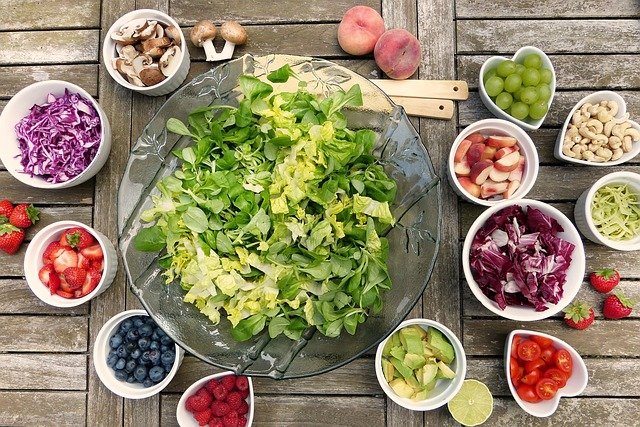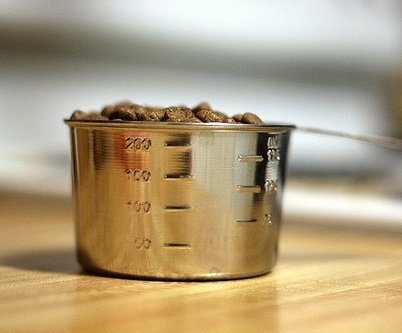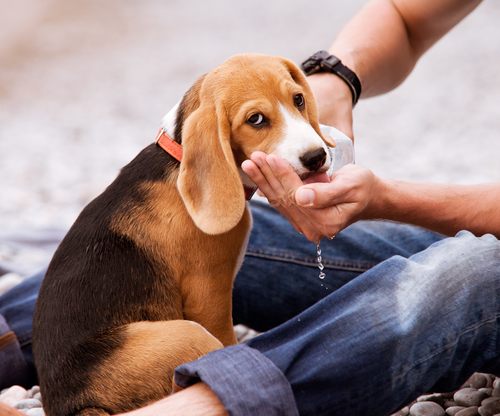Finding good vegan dog food in the store is not always easy. The options are somewhat limited, and those that are out there tend to be really expensive. If you’re ready for a challenge, you can make dry vegan dog food yourself at home. It’s not complicated, necessarily, but it is just about as time-consuming as baking a huge batch of cookies. That said, you also have to put in a lot of time researching and ensuring you’re making the right substitutions for animal protein in your dog’s diet. Dogs are not humans living in Los Angeles and trying to be on-trend. Dog owners have to use the right foods to keep their dogs healthy.
Is Vegan Food Safe for Dogs?

There is a lot of debate about whether vegan dog food is safe for dogs. Some people think that our dog’s wolf ancestors ate only meat and believe that modern dogs should eat a diet that is primarily animal-based. The truth is that dogs are omnivores, and over time, they have evolved to be able to digest and make use of a variety of foods, including fruit, vegetables, and grains.
Vegan diets, for people or dogs, use no animal products. That means no meat, fat, or eggs, among other things. But there are many other sources of protein that can help make up for this in a vegan diet.
When deciding what to feed your dog, it’s always best to check with your vet. As a pet parent, we know you want to do the best thing for dogs, but it’s important to understand the risks and benefits of any diet, including vegan dog food.
Most vets are likely to not recommend a vegan diet, which is something you should consider when making your decision. While dogs can get nutrients from other sources, they are not herbivores and do best when they get some animal protein. But, if you yourself are vegan and educated about how to maintain a nutritional balance with other foods, your vet may be more receptive to it.
With any homemade vegan dog food recipe, the most important thing is to make sure the dog food is balanced with the right amount of proteins, minerals, vitamins, and amino acids. Amino acids, like L-carnitine and taurine, are especially important as they can lead to severe heart problems.
Plant proteins are great, but they don’t have the full spectrum of amino acids that dogs need so it’s important to make sure your dog food recipe contains the right mix of plant proteins and supplements to make up for this.
Contents
What to Watch When Your Dog is on a Vegan Diet?
If you decide to move forward with a vegan diet for your dog after consulting your vet, there are some things to look out for to make sure your dog stays healthy.
If your dog’s coat is dull and its skin is dry and itchy, there’s a good chance it’s not getting enough essential fatty acids. These changes don’t happen quickly, though, and may not show up until several months after switching their diet.
If you notice your dog is having trouble peeing or it is painful, it may have developed struvite kidney stones and should be seen by the veterinarian right away.
Any changes you notice should be reported to your veterinarian to make sure your dog is healthy. Simple lab tests can determine if your dog is experiencing any deficiencies so you can make any necessary corrections.
What Foods are Good for Vegan Dog Food?
If you’re not sure where to start, here are some things you can include in your homemade vegan dog food that are both affordable and safe:
- apples
- artichokes
- bananas (in moderation)
- barley
- bell peppers
- black beans
- broccoli
- blueberries
- cabbage
- carrots
- cauliflower
- celery
- chia seeds
- chickpeas
- coconut oil
- cucumber
- flax seeds
- green beans
- hemp seeds
- kale
- lentils
- lettuce
- mangos
- natural peanut butter
- oats
- oranges
- peas
- pears
- pinto beans
- potatoes
- pineapples
- pumpkin
- pumpkin seeds
- raspberries
- rice
- sesame seeds
- spinach
- squash
- strawberries
- sweet potatoes
- sunflower oil
- sunflower seeds
- quinoa
- watermelon
- wheat
- zucchini
There are also some foods that you should never feed your dog as they are dangerous to their health. Avoid these foods completely:
- alcohol
- artificial sweeteners
- avocados
- bacon
- baked goods
- candy
- cherries
- chocolate
- coffee
- cinnamon
- corn
- garlic
- grapes
- lemons
- limes
- nutmeg
- onions
- oranges
- macadamia nuts
- raisins
- raw dough
- tea
- whole almonds
Note that some foods, like beans and broccoli, may cause excess gas. Monitor how your dog responds and adjust recipes as needed.
Healthy Guidelines
Here are some important things you should keep in mind when exploring veganism for your fur babies:
- Don’t use any ingredients with excessive fat, oil, or sugar. For example, natural peanut butter is fine, but avoid store brands that are loaded with added sugar.
- Fruit is fine in moderation, but most do contain a lot of simple carbs so don’t overdo it.
- Get the support of an expert to be sure that your pet gets the nutrition it needs to stay healthy.
- Remember, you have to incorporate enough protein for energy and muscle maintenance, amino acids for cardiac health and muscle development, calcium and vitamins for bone health, and fatty acids for skin and coat health.
- Follow up with your veterinarian regularly so you can make sure your dog stays healthy. Vitamin and mineral deficiencies are quite common in vegan diets if they are not done properly. When starting a vegan diet, you may not notice any changes, but some issues take time to develop. If your dog doesn’t get everything it needs, severe problems with the immune system, heart failure, and other conditions can develop over time.
- Don’t feed vegan dog food to puppies. It is crucial that puppies get a mix of healthy food, including meat animal proteins, to grow and develop properly.
Vegan Dog Food Recipes
If you’re ready to try your hand at making vegan dog foods, here are some recipes to try, no meat or animal products included.
Pinto Beans and Rice Dry Vegan Dog Food
4 cups of cooked pinto beans
4 cups cooked brown rice
2 chopped sweet potatoes
2 chopped carrots
2 cups lettuce
1 cup mashed peas
4 tablespoons flax seeds
4 tablespoons natural peanut butter
2 tablespoons coconut oil
water
Instructions:
Chop potatoes and carrots. Mix beans, peas, rice, potatoes, carrots, and flaxseeds in a large pot and cover with water. Boil until the carrots and potatoes are cooked.
Once the potatoes and carrots are soft, strain the mixture, and add it and the rest of the ingredients to your food processor. Process it on a puree setting.
Use the coconut oil to grease a large baking pan and spread the mixture out in a thin layer. Bake at 350 degrees for 40 minutes, then remove and flip the mixture over. Lower the heat to 325 and bake for 30 minutes.
Remove from the oven and break the mixture into small, kibble-sized pieces. If you have a small dog, break it into smaller pieces. Then, return the mix to the baking sheet. Lower the oven temperature to 225 and bake for about a half-hour or until the pieces are completely dry.
This recipe will last a medium-sized dog about five days. You can double or triple it to make larger batches and store it in an air-tight container if you prefer to make it in bulk.
Sweet Potato and Peanut Butter Mash
1 cup whole grain rice
1 cup quinoa
2 cups lentils
6 cups natural peanut butter
4 tablespoons flaxseed oil
1 teaspoon cranberry extract
2 large yams
Water
Instructions:
Chop yams into small cubes. Cook rice, yams, lentils, potatoes, and quinoa in boiling water. Reduce heat and allow to simmer until everything is tender, usually between 35 and 45 minutes. Then, remove from heat, strain, and allow to cook.
Once cooled, add peanut butter and mash ingredients together. Serve with a drizzle of cranberry extract and flaxseed oil. This food recipe makes between six and eight servings.
Vegan Burgers for Dogs
6 cups black beans (or any bean your dog likes)
2 sweet potatoes, baked
6 slices multigrain bread
4 tablespoons pumpkin seeds
4 tablespoons sunflower seeds
4 tablespoons ground flaxseeds
4 cups fresh spinach
1 cup cooked and mashed peas
2 tablespoons nutritional yeast
Water
Instructions:
Crumble bread. If using dried beans, cook and let cool. Add all ingredients to a blender and mix until pureed. Add water as needed to maintain the right amount of moisture. Refrigerate for a half hour.
Form mixture into patties. Place the food on a baking sheet and cook in the oven at 350 degrees for ten minutes. Then, flip and cook the food for 10 more minutes. Allow to cool and serve.
Banana and Peanut Butter Sweet Treats
4 cups rice flour
2 cups oats
2 cups cashew milk
1 cup almond flour
1 cup coconut flour
4 ripe bananas
2 cups natural peanut butter
1 cup fresh pumpkin (note, use pumpkin, not pumpkin pie filling)
1/2 cup vegan honey
Instructions:
Add flours, oats, and brown rice into a large mixing bowl. Mash the bananas, and add all ingredients to the bowl. Blend together until the mixture forms a dough, adding more cashew milk if necessary.
Flatten or roll the dough and cut into pieces or use a cookie cutter in the desired shape. Bake at 350 degrees for about 15 minutes. Cool and serve. Store in an airtight container in the refrigerator or freeze and thaw as needed.
Store-Bought Vegan Dog Food
If you’re looking for a good store-bought brand of vegan pet food, take a look at v-dog. This brand has a unique vegan recipe that has an impressive 24 percent crude protein and was formulated to meet the AAFCO guidelines. Generally, if you’re trying to get your veterinarian onboard and tell them that the began food you want to use meets AAFCO guidelines, they are likely to be a lot more supportive.
V-dog kibble contains a healthy balance of vitamins and minerals from ingredients like peas, oats, and no meat, wheat, corn, or soy. It’s a great choice for dogs with food allergies or sensitivities. It contains 24 percent crude protein and 9 percent crude fat.
The ingredient list is as follows: Dried Peas, Brown Rice, Peas Protein Concentrate, Oats, Sorghum, Lentils, Canola Oil, Peanuts, Sunflower Oil, Potato Protein, Brewers Dried Yeast, Alfalfa Meal, Flaxseeds, Natural Vegetable Flavor, Quinoa, Millet, Calcium Carbonate, Dicalcium Phosphate, Salt, Potassium Chloride, Vegetable Pomace (Carrot, Celery, Beet, Parsley, Lettuce, Watercress & Spinach), Taurine, Vitamins (Vitamin E Supplement, Niacin, D-Calcium Pantothenate, Vitamin A Supplement, Biotin, Vitamin B12 Supplement, Vitamin D2 Supplement, Riboflavin Supplement, Thiamine Mononitrate, Pyridoxine Hydrochloride, Folic Acid), Choline Chloride, Minerals (Zinc Sulfate, Ferrous Sulfate, Copper Sulfate, Manganous Oxide, Sodium Selenite & Calcium Iodate), DL-Methionine, L-Lysine, L-Carnitine, Parsley Flakes, L-Ascorbyl-2-Polyphosphate (Source of Vitamin C), Dried Cranberries, Dried Blueberries, Preserved With Citric Acid and Mixed Tocopherols (Form of Vitamin E).
How Do Vegan Dog Foods Compare
If you’re interested in the health benefits of a vegan diet but are confused by the information you’ve heard, you might be hesitant to make homemade vegan dog food or even attempt to switch to this diet. The truth is that vegan diets can be safe and benefit your dog, especially if they have health issues, as long as you incorporate the right food.
That said, there are some risks with a homemade vegan dog diet. It is very easy for vegan recipes to be unbalanced, omitting some of the nutrients, vitamins, and minerals your pup needs to thrive. If your homemade vegan dog food is not made with the right dog food recipe ingredients, your dog’s health can suffer in the long run.
If you follow veganism and want to try this lifestyle for your pet, talk to your veterinarian. Some do not support a vegan diet for dogs, but others are willing to work with you to make sure your dogs get the food and supplements it needs to stay healthy. Remember, dogs are not humans and your pup needs special attention and care when switching to a vegan diet. There are safe ways to do it, to be sure, but the best way is under the supervision of your veterinarian to keep your pup safe.
I grew up in a household that was filled with animals. I believe that my fate as a dog-loving person was sealed in early childhood since my parents owned several dogs of varying sizes and breeds. There was no choice but to take care of and learn about dog habits and the best animal care practices — otherwise, I’d be clueless about how to go about the creatures I was surrounded by day and night.
As a life-long puppy lover, I know a thing or two about dogs and how to go about caring for them in the best way possible. Although I’m not a professionally trained dog behaviorist, trainer, or veterinarian, all of my knowledge and experience with canines comes from a place of love and a deep-rooted passion for dogs and animals in general.
Seeing as dogs kept me company throughout every stage of my life, I decided to follow a different path in my academic life and obtained a Bachelor’s and Master’s degrees in Marketing Management and Digital Advertising, which ultimately allowed me to combine my professional training and personal experience by creating the ultimate dog lover’s resource website! Along with my husband, Dave, I run MySweetPuppy for like-minded dog lovers who want to have a single, clear, and reliable information source about anything and everything related to dogs and their well-being.



